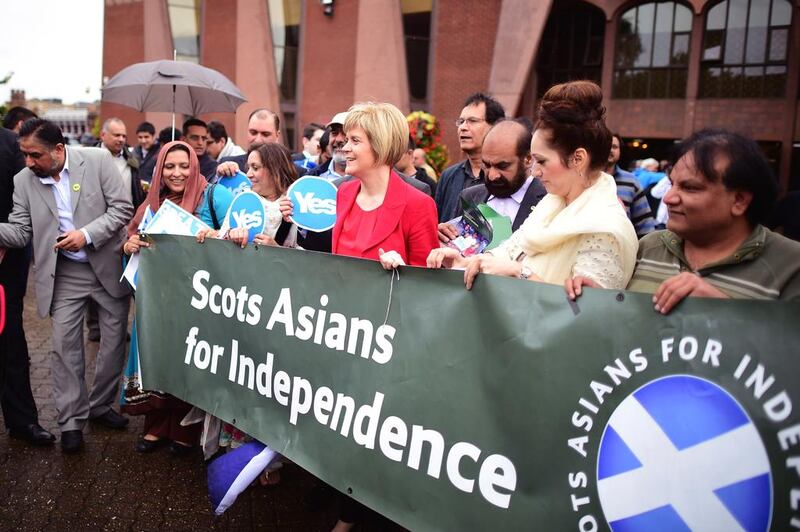All over Europe, the centre cannot hold. In country after country, the duopolies of mainstream parties of left and right have teetered or fallen. Greece’s Syriza, a new coalition of leftists, has recently been polling at 35 per cent and came first in Greece’s part of European elections, breaking the stranglehold of the socialist Pasok and conservative New Democracy.
In others, the cosy alternation of power has been disrupted. Germany’s Social and Christian Democrats now have to take into account parties further to the left and right than the liberal Free Democrats who have been in coalition governments for the majority of the country’s post-war history.
Some states have virtually thrown out the broad model that has operated in Western Europe. Hungary is the most notable of these with prime minister Victor Orban, declaring that “the era of liberal democracies is over”. In others, the very existence of the nation state has been threatened by resurgent secessionist parties, such as Scotland’s SNP and the Catalan National Assembly in Spain.
Many have been alarmed and surprised by these attacks on the status quo, and appear to believe that it is a new phenomenon. The actual fracturing of the systems may be, but the roots go far back. The causes and the symptoms were always there for those who wished to recognise them. The duopolies were so certain of their continued dominance that they were dismissive of parties that they regarded as minnows or just not serious. It was not long ago that the British prime minister, David Cameron, was describing UKIP as a party of “fruitcakes, nutters and closet racists”. Now he has lost one seat to Nigel Farage’s Euro-sceptics, and may lose another in this week’s by-election. UKIP’s rise has even led to talk of Mr Cameron facing a leadership challenge.
Mr Cameron should have been more aware than most that just because the systems were loaded in the main parties’ favour, that did not mean there were not substantial constituencies opposed to the prevailing dispensations. He has, after all, been in coalition with one such constituency – the Liberal Democrats – who had consistently been ridiculed by Conservative and Labour politicians because their representation in parliament was small.
One sign that two-party dominance has been losing its legitimacy has been obvious for a very long time. As far back as 2006 I edited a collection of essays for the UK’s New Statesman magazine titled The Political Party: RIP?, in which the constitutional historian, Professor Vernon Bogdanor, pointed out that in the 1950s the Conservative Party had a membership of nearly three million. Eight years ago, that figure was down to 250,000. Overall, as he put it, “50 years ago, one in 11 of the electorate belonged to a political party; today just one in 88 do”. This steep decline in membership of mainstream political parties – which is a Europe-wide phenomenon – is clearly indicative of a lessening appeal at best, disenchantment at worst.
But it is not surprising when political classes appear to be divorced from those they are supposed to represent, with little apparent experience of the lives that ordinary people lead. Francois Hollande is just the latest French leader to have been educated at ENA, the Ecole Nationale d’Administration, along with seven prime ministers since 1984, and to have had no career outside politics. Britain’s Labour leader, Ed Miliband, suffers similarly from the fact that his only job prior to working for his party was as a researcher – for a television show called A Week in Politics.
What we are seeing now is large sections of many populations, whose views had been marginalised by the governing elite, finally breaking through – and it’s no wonder they’re angry. This atomisation of politics and distrust for politicians has been caused by the failures of the old duopolies: not just failures in governance, laid bare by the catastrophe of the financial crisis of 2008-2009 and the almost equally damaging response, but also a failure to listen.
As Philippe Legrain, a former adviser to the president of the European Commission, put it in The Guardian this week: “People are right to be angry. Unfortunately they often direct their anger at scapegoats, notably immigrants, rather than the bankers and policymakers who have driven Europe into the ditch. The problem is that there is not a sensible alternative to the mainstream consensus, leaving a vacuum that extremists and charlatans have filled.”
Mr Legrain sounds slightly in danger of taking the same line as the parties who have drifted away from their populaces while maintaining, until recently, their grip on power.
But if “extremists and charlatans” are appearing – and those are descriptions that the newly strengthened outsider groups, from Podemos in Spain to the Five Star Movement in Italy, would reject – he is on safer ground when identifying who to blame. To suggest that this is new or solely a response to recent events, however, is completely wrong. This is a reckoning for Europe’s democracies that has been a long time in the making. It’s just that their leaders refused to see it.
Sholto Byrnes is a commentator and editor based in Doha and Kuala Lumpur





